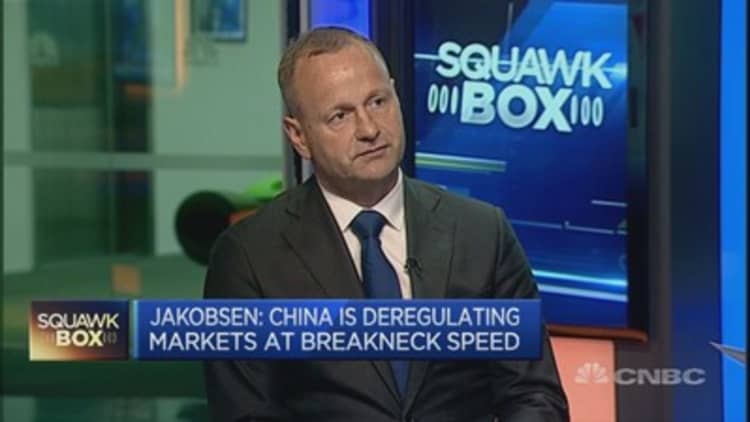
The dollar's appreciation has "peaked," the U.S. economy is "doing nothing" and China will soon be vying with the country on the global stage, an economist has told CNBC.
"We're having a perfect storm for the dollar," Steen Jakobsen, the chief economist at Danish investment bank Saxo Bank, told CNBC Monday.
A rate hike by the U.S. Federal Reserve might be just around the corner, but Jakobsen described it as nothing more than a "margin call," implying that it was a warning shot to investors that a seven-year bull run for equities might be coming to an end.
"On any model I look at, (the U.S. economy) is still way too weak in a normal cycle to actually take and live with the higher interest rate," he said.
The greenback has rallied 20 percent against a basket of leading currencies since the beginning of 2014. This has come as the Fed looks to normalize its monetary policy after several years of bond-buying on a massive scale and ultra-low interest rates.
The higher yield a Fed hike would bring has seen investors already pull money back to the U.S. Many economists believe this cycle is far from over and actually predict that the dollar's appreciation has further to run. For example, Deutsche Bank's George Saravelos said in a note Thursday that there was at least a 10 percent appreciation of the trade-weighted dollar left in the current cycle.
But Jakobsen has other ideas, and predicts that its fall will coincide with the rise of China's renminbi.
Christine Lagarde, the managing director of the International Monetary Fund, has spoken favorably of China's currency this year and there are plans afoot for it to be included in the IMF's SDR (special drawing rights) basket, which it uses as a supplementary foreign exchange reserve.
The Chinese currency will therefore overtake the U.K. pound as the world's number three currency (in foreign exchange volumes) in less than three years, according to Jakobsen. He sees a resurgence for the world's second largest economy in the coming years.
"The one difference with China and the rest of the world is that they have a plan, you may disagree with the plan, but they actually do have a plan," he said.
The internationalization of the renminbi will mean sovereign wealth funds will start to "play and act very aggressively," Jakobsen added.
He predicts that China's foreign exchange reserves of more than $3 trillion will start to be invested. With a sizeable chunk of China's reserves being held in dollar-denominated assets, he added that this investment would be to the detriment of the dollar and U.S. bond markets.


